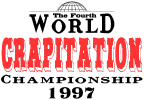 Crapitation
Crapitation Crapitation
CrapitationMore recently, the sport received some recognition by no less a figure than Robert Burns, the Scottish poet, who makes several references to it in his 'Merry Muses of Old Caledonia'. By Burns' time, the sport was known of throughout Great Britain, and in parts of France, Germany, Canada, and the infant United States. Known to have been a keen Freemason, it is possible that Burns became aware of it through his Masonic connections, and indeed this may explain why the sport has survived in relative secrecy, while appearing at times to have become extinct. Reputedly there is a Masonic organisation known as the 'Sept of Syncopated Windbreakers', but there is no published evidence of this.
The first internationally organised competition was held in 1783, where François Phoophe (France) beat Sandy McWind (Scotland) before dropping dead of exhaustion!
Whilst remaining popular in many parts of the world, notably among the cattle drovers of the Wild West, the sport continued mainly at a local level with little or no international activity, until the early 20th Century, when an unofficial second world championship was organised and held in Paris in 1902, being opened by Joseph 'Le Pétomane' Pujol.
In 1932 the third international competition was held in the Hofbräuhaus, Munich, when the Englishman Lord Windesmere won a memorable and highly audible victory over his German opponent, Gustav Donnerfurz.
Just after the end of World War II, in late 1945, a third - competition the first official one - was held in the Maple Leaf Auditorium, Montreal, Canada, and broadcast over the CBC Radio network. In this contest, Paul Boomer of Australia snatched victory from the reigning champion, Lord Windesmere, who was disqualified after having a most unfortunate accident during the competition.
Despite the interest generated by the 1945 broadcast, the sport once again declined into the doldrums, and it was only in 1984 that interest was reawakened when a tape of the broadcast began circulating in London. In 1993 a 'spin doctor' working for the Labour Party latched on to the potential of the sport as a potent political weapon, interest grew, culminating in the major politically- charged competition to be held later this year.